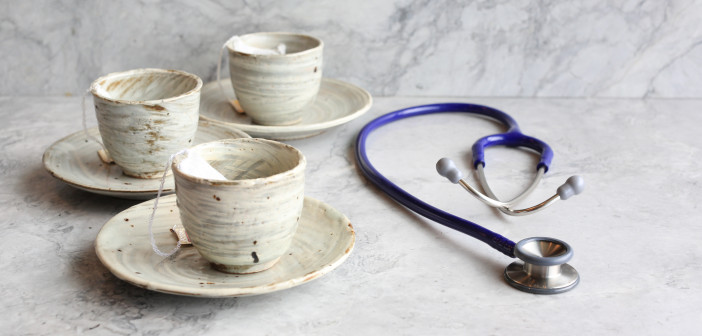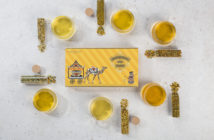ASK ANYONE: Our nation is stressed out. According to a growing body of research, societal stress has reached epidemic proportions—and because stress has been linked to many chronic diseases, it’s not a problem that can be written off as simply a troubling side effect of busy modern life. Something has to be done for the good of our health. But help is here: Recent medical evidence shows that several teas and tisanes provide easy, cost-effective ways to relieve stress— welcome news for those of us who already turn to tea to relax.
Stress and anxiety can be debilitating, upsetting our hormonal balance and leading to serious health issues, including cardiovascular disease, depression, diabetes, insomnia, and obesity. “In order for our nation to get healthier, lower the rates of chronic illnesses, and lower health care costs, we need to improve how we view and treat the stress and unhealthy behaviors that are contributing to the high incidence of disease in the U.S.” said Norman B. Anderson, PhD, CEO of the American Psychological Association.
The World Health Organization estimates that more than 450 million people suffer from stress worldwide, with 17 percent of Europeans stating that stress is the most important risk factor to health. These statistics are daunting and one can’t help but wonder how people cope with this much stress on a daily basis. Fortunately, recent research continues to demonstrate the ability of teas and tisanes to counteract the biological effects of stress.
Compound Interest
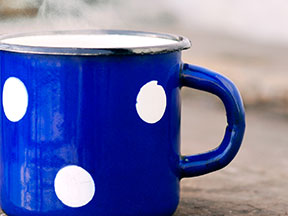 Two natural compounds have been shown to reduce stress levels: 1) L-theanine, one of the predominant amino acids found exclusively in tea; and 2) catechins, flavonoid phytochemical compounds found principally in green tea and, to some extent, in black tea.
Two natural compounds have been shown to reduce stress levels: 1) L-theanine, one of the predominant amino acids found exclusively in tea; and 2) catechins, flavonoid phytochemical compounds found principally in green tea and, to some extent, in black tea.
L-theanine has been used as a relaxing agent for centuries—it’s been found to soothe anxiety without harsh side effects, and can diminish the body’s sympathetic response to an acute stressor. Basically, it can decrease heart rate, lessen the “fight or flight” response, and help us maintain a more balanced reaction when we are confronted with stress. Further, L-theanine increases dopamine and serotonin levels in the brain, which may account for its anxiety-reducing properties.
Catechins are part of a larger group of antioxidants known as polyphenols. These powerful chemicals have been shown to positively affect neurotransmitters in the brain, making it easier to maintain mental balance. Tea-derived polyphenols combat the oxidative stress associated with neurodegenerative and cardiovascular diseases, such as Parkinson’s or hypertension. In essence, their actions reduce free radical damage to cells and have a protective effect on our bodies.
Download our free Wellness & Tea 101 E-Book
A Many-Splendored Leaf
Although black tea and green tea come from the same plant, Camellia sinensis, the processing method for each tea is different. Green tea is lightly steamed or heated to stop the oxidation process; it’s only minimally processed from its natural form. Black tea leaves, on the other hand, are allowed to oxidize. They undergo more processing, which includes fermentation, the cause of black tea’s darker color. When black tea is processed, a large portion of the catechins is converted into compounds known as theaflavins. While green tea has approximately twice the concentration of catechins, black tea still retains a fair amount. The theaflavins in black tea provide their own health benefits, particularly helping maintain heart health.
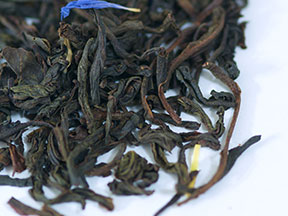 Black Tea
Black Tea
British researchers from the University College of London (UCL) report that daily cups of tea can help one to recover quickly from the stresses of everyday life. The study found that people who drank tea were able to de-stress more quickly than those who drank a tea substitute. The UCL study also found that blood platelet activation, which is linked to blood clotting and the risk of heart attack, was lower in the tea drinkers, and that group reported a greater degree of relaxation in the recovery period after the task they were assigned as part of the study.
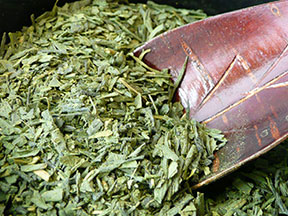 Green Tea
Green Tea
Studies have often suggested that green tea and its extracts may offer protective effects against neurodegenerative diseases and certain cancers. Further, green tea has also been associated with improved cardiovascular and oral health, and may play a positive role in weight management. A large-scale Japanese study reported that green tea might also reduce psychological stress and may offset the signs of physical and mental fatigue associated with our stressful modern lives. Essentially, the study showed that as green tea consumption increased, mental stress decreased.
Tension-Taming Tisanes
Herbal teas are not actually teas, but are properly called tisanes. “Tisane” is a French word meaning “infusion or decoction,” a drink made from a plant other than Camellia sinensis. They are primarily caffeine-free alternatives to true teas, and can be consumed as pure brews or combined to form an herbal blend. A number of herbal tisanes are associated with calming the mind and body.
When choosing your herbal drinks, please keep in mind that some herbs shouldn’t be used by people with certain medical conditions and others can interact negatively with medications. Check with your physician before using any new herb or drink.
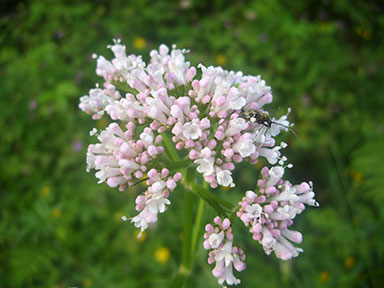 One calming tisane with a long history is valerian (Valeriana officinalis)—its use has been traced all the way back to ancient Greece and Rome. A cup of this herbal remedy has a calming effect on the central nervous system. Meanwhile, modern research has continued to support its application as a sleep aid: It’s been shown to help you fall asleep faster and improve sleep quality. Since stress can be a significant contributor to poor sleep, this helps in several ways: Valerian can help you to de-stress, making it easier to sleep; and by helping you feel rested, it can make it easier to cope with stress during the day. Valerian can also help you feel more refreshed upon awakening. Furthermore, this tisane can relax the muscles of the digestive tract. For some, a stressful day can lead to an upset stomach and valerian can offer some much-needed relief.
One calming tisane with a long history is valerian (Valeriana officinalis)—its use has been traced all the way back to ancient Greece and Rome. A cup of this herbal remedy has a calming effect on the central nervous system. Meanwhile, modern research has continued to support its application as a sleep aid: It’s been shown to help you fall asleep faster and improve sleep quality. Since stress can be a significant contributor to poor sleep, this helps in several ways: Valerian can help you to de-stress, making it easier to sleep; and by helping you feel rested, it can make it easier to cope with stress during the day. Valerian can also help you feel more refreshed upon awakening. Furthermore, this tisane can relax the muscles of the digestive tract. For some, a stressful day can lead to an upset stomach and valerian can offer some much-needed relief.
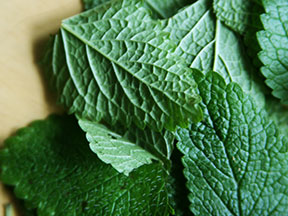 Lemon balm (Melissa officinalis), which is sometimes used as a mild sedative, appears to have a calming effect. In one study, it was combined with valerian; the combination not only reduced stress but also improved sleep quality and quantity. Potential uses even include treating stomach discomfort and cramping, which can be another side effect of stress.
Lemon balm (Melissa officinalis), which is sometimes used as a mild sedative, appears to have a calming effect. In one study, it was combined with valerian; the combination not only reduced stress but also improved sleep quality and quantity. Potential uses even include treating stomach discomfort and cramping, which can be another side effect of stress.
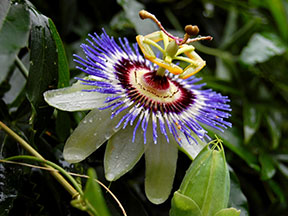 Passionflower (Passiflora incarnata) has been shown in several studies to have stress- and anxiety-reducing properties. Remarkably, this tisane was comparable to anti-anxiety medication in its effectiveness! Even better, while it can decrease symptoms of anxiety, it does not have the harsh side effects of many prescription medications. And the benefits of passionflower extend beyond its soothing properties to include uses as a sedative and anti-spasmodic. So even as it calms you, passionflower can help with insomnia and to relax sore muscles.
Passionflower (Passiflora incarnata) has been shown in several studies to have stress- and anxiety-reducing properties. Remarkably, this tisane was comparable to anti-anxiety medication in its effectiveness! Even better, while it can decrease symptoms of anxiety, it does not have the harsh side effects of many prescription medications. And the benefits of passionflower extend beyond its soothing properties to include uses as a sedative and anti-spasmodic. So even as it calms you, passionflower can help with insomnia and to relax sore muscles.
As you can see, tea is more than just a tasty beverage: It’s an essential ingredient in helping maintain a peaceful and balanced life. Whether you choose a tea or tisane, the end result will be a moment of relaxation in your busy day, with the added benefit of increased well-being. With these nourishing and healthful options, you can decompress and heal from life’s daily stressors. Drink tea, live better!
Want to sip away your anxiety? Here’s a quick cheat sheet!
Stress-Busting Teas
- Green Tea – lowers anxiety and mental stress
- Black Tea – promotes relaxation and stress recovery
Calming Tisanes
- Lemon Balm – a relaxing herb for mind and body
- Passionflower – an aid for sleep and stress-induced anxiety
- Valerian – can decrease stress, improve sleep, and ease upset stomach
Dive deeper into the research with these studies:
- Institute for Natural Healing. Stress-Busting Nutrient in Green Tea Ends Anxiety. Available at: http://institutefornaturalhealing.com/2012/06/stress-busting-nutrient-in-green-tea-ends-anxiety.
- American Psychological Association. Health Care System Falls Short on Stress Management. Available at: http://www.apa.org/news/press/releases/2013/02/stress-management.aspx. .
- NUTRA Ingredients. Green Tea May Ease Mental Distress: Study. Available at: http://www.nutraingredients.com/Research/Green-tea-may-ease-mental-distress-Study.
- Lu K, Gray M, Oliver C, Liley D, Harrison B, Bartholomeusz C, Phan K, Nathan P. The acute effects of L-theanine in comparison with alprazolam on anticipatory anxiety in humans. Hum Psychopharmacol. 2004;19(7):457-465.
- Teas etc. Black Tea and Stress Reduction. Available at: http://www.teasetc.com/tea/article.asp?ID=80&Name=Black+Tea+and+Stress+Reduction
- Kimura K, Ozeki M, Juneja L, Ohira H. L-Theanine reduces psychological and physiological stress responses. Biol Psychol. 2007;74(1):39-45.
- Yokogoshi H, Kobayashi M, Mochizuki M, Terashima T. Effect of theanine, r-glutamylethylamide, on brain monoamines and striatal dopamine release in conscious rats. Neurochem Res. 1998;23(5):667-673.
- Cooper R, Morré DJ, Morré DM. Medicinal benefits of green tea: Part 1. Review of noncancer health benefits. J Altern Complement Med. 2005;11(3):521-528.
- European Food Information Council. Black tea can soothe away stress. Available at: http://www.eufic.org/page/en/show/latest-science-news/fftid/black-tea-stress/.
- Hozawa A, Kuriyama S, Nakaya N, et al. Green tea consumption is associated with lower psychological distress in a general population: the Ohsaki Cohort 2006 Study. Am J Clin Nutr. 2009;90(5):1390-1396.
- Livestrong. Benefits of Tisane Tea. Available at: http://www.livestrong.com/article/519558-benefits-of-tisane-tea/.
- Kennedy D, Little W, Scholey A. Attenuation of laboratory-induced stress in humans after acute administration of Melissa officinalis (Lemon Balm). Psychosom Med. 2004;66(4):607-613.
- Cerny A, Schmid K. Tolerability and efficacy of valerian/lemon balm in healthy volunteers (a double-blind, placebo-controlled, multicenter study). Fitoterapia.1999;70:221-228.
- Madisch A, Holtmann G, Mayr G, Vinson B, Hotz J. Treatment of functional dyspepsia with a herbal preparation. A double-blind, randomized, placebo-controlled, multicenter trial. Digestion. 2004;69(1):45-52.
- Akhondzadeh S, Naghavi H, Shayeganpour A, et al. Passionflower in the treatment of generalized anxiety: a pilot double-blind randomized controlled trial with oxazepam. J Clin Pharm Ther. 2001;26:363-367.
- Dhawan K, Jumar S, Sharma S. Anti-anxiety studies on extracts of Passiflora Incarnata Linneaus. J of Ethnopharmacol. 2001;78:165-170.
- Bent S, Padula A, Moore D, Patterson M, Mehling W. Valerian for sleep: a systematic review and meta-analysis. Am J Med. 2006;119(12):1005-1012.
This article was originally published in the September-October 2013 issue of Tea Magazine.

